#karlstadt
Text
Nach dem Urlaub ist vor dem Urlaub
Zehn Gründe, um 2024 eine Reise nach Karlstadt am Main einzuplanen
(DJD). Save the date: Mit diesem Hinweis wird man von Freunden und Verwandten ganz frühzeitig über ein bevorstehendes Fest, etwa eine Hochzeit oder einen runden Geburtstag, informiert. Die Gäste können sich dann lange auf das Ereignis freuen und werden sich für diesen Tag nichts anderes vornehmen. Genauso sollte man es auch beim…
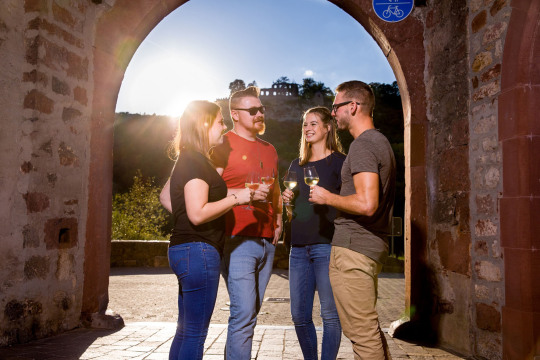
View On WordPress
0 notes
Text
Hotel in Karlstadt schnell finden – Rooms24
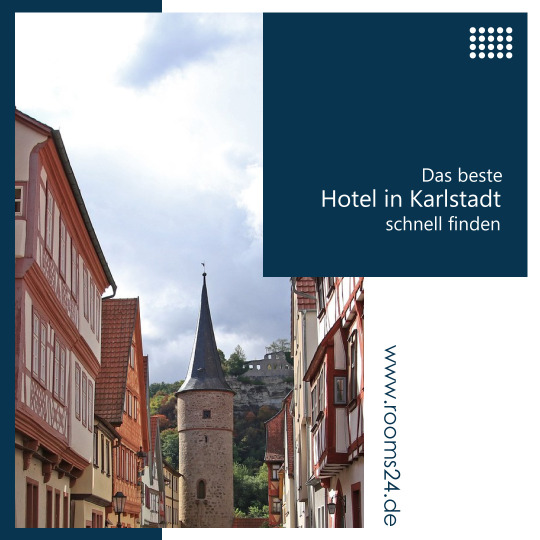
Buchen Sie jetzt das beste Hotel in Karlstadt! - Rooms24
#deutschland#karlstadt#rooms24#rooms#ferienvermietung#ferienhaus#ferienwohnung#monteurzimmer#gästezimmer#unterkünfte#privat unterkünfte#unterkunft#hotelangeboten#luxury hotel#hotels#hotel#hotels and resorts
0 notes
Text
Neuer Anstrich für Historisches Rathaus in Karlstadt
Neuer Anstrich für Historisches Rathaus in Karlstadt
Karlstadt: „…Das Historische Rathaus ist seit Montag eingerüstet: Zum 600. Geburtstag im Sommer soll es einen neuen Anstrich bekommen, denn besonders die Fassade zum Marktplatz hin ist nicht mehr ansehnlich. Die ochsenblutrote Farbe der Fensterumrahmungen hat Regen im Laufe der Jahre durch den ihre Spuren auf dem hellen Untergrund hinterlassen.
Der stattliche Rechteckbau mit den gotischen…

View On WordPress
#Anstrich#Bürgersaal#Farbe#Fassade#Fensterumrahmung#Gebäude#historisch#Karlstadt#Marktplatz#Rathaus#Reckteckbau#Spuren#Treppengiebel
0 notes
Text
"Ich war die Erste" – Adelheid Schmidt-Thomé liest und spricht mit Uwe Kullnick über ihr Buch - Hörbahn on Stage
[vc_row][vc_column][vc_column_text]
“Ich war die Erste” – Adelheid Schmidt-Thomé liest und spricht mit Uwe Kullnick über ihr Buch – Hörbahn on Stage
Lesung Adelheid Schmidt-Thomé(Hördauer ca. 30 min)
https://literaturradiohoerbahn.com/wp-content/uploads/2023/03/HoS-Schmidt-Thome-Lesung-upload.mp3
Gespräch zwischen Adelheid Schmidt-Thomé und Uwe Kullnick (Hördauer ca. 49…
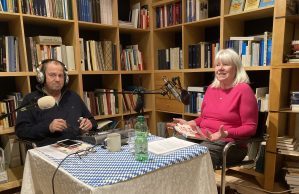
View On WordPress
#Adelheid Schmidt-Thomé#Allitera#bayerische Frauen#Elisabeth Mann-Borgese#Hörbahn on Stage#Ich war die Erste#Katharina Gruber.#Kathrin Switzer#Liesl Karlstadt#Pionierinnen#Uwe Kullnick
0 notes
Text
Something Wicked This Way Comes, Chapter 1.

Many Years Ago.
(Two men ride their horses quickly through the countryside in the pouring rain. Crossing a long stone bridge, the two men reach the town of Karlstadt.)
Karlstadt.
(The men are stopped at the gates by guards.)
Guard: “Halt! State your business!”
Jacob: “Monsieur, we're looking for food and lodging.”
(The guards look to each other and then let the two riders pass.)
Guard: “On your way then.”
Wilhelm: “Thank you, Sir.”
(The men ride on into the walled town. They pass by a former soldier begging for money.)
Soldier: “A little something, sir? Help an old soldier. Help an old soldier, sir. (Jacob leans down and tosses a gold coin to the man:) Oh, thank you. Thank you, sir. God bless you, sir.”
(Reaching the stables, they come upon a young man touting for business.)
Young Man: “Groom your horses, sirs?”
Wilhelm: “Do you know the mayor of this town?”
Young Man: “Only groom for the best, sir.”
Wilhelm: (Hands him a letter:) “Then give him this.”
Young Man: (Reading the wax seal on the letter:) “The Brothers Grimm?”
Wilhelm: “Every second counts.”
Town Hall.
(The people of the town are gathered to hear testimony of a miller who is suspected to have encountered a witch.)
Old Miller: “The witch comes in the dead of night, when the moon is well-hid. She comes out of the darkest, coldest blackness. (He screams, causing the townsfolk to gasp in surprise:) Her cry would freeze the very blood in your veins.”
Wilhelm: “You were right to send for us. How many here have seen her?”
Mayor: “Everyone who lives by the old mill stream has seen her. It was a hundred years ago. The miller's wife was burned at the stake for witchcraft, and they tossed her charred bones into the river.”
Jacob: (While writing all of this down:) “Ancient law dictates that her remains should have been
sealed in a mirror-lined box.”
Mayor: “Ah, well, for nights thereafter children saw her walk the riverbank, beckoning them to her.”
Jacob: “And a good many did. The mill witch of Karlstadt.”
Wilhelm: “Yes. (Pats his brother on the back:) We know the legend.”
Miller’s Daughter: “Then you believe us?”
Wilhelm: “Why, I'd believe anything you choose to tell me, my lady.”
Old Miller: (Stands, shakily:) “Come to my mill. Such ungodly horrors! Such banshees screeching. And if you dare set eyes upon...”
Mayor: “Shut up! Give him his medicine. (The Miller turns to his daughter who hands him a bottle:) Brothers Grimm, we're at our wit's end. What can you do for us?”
Wilhelm: (While writing, distractedly:) “It's difficult. Jake?”
Jacob: “When you burn a witch, her soul burns eternally, so the exorcism of witches requires a very special method.”
Wilhelm: “And expensive.”
Jacob: “Only an arrow of innocent tears, that is child's tears, shot directly through the heart can put out that fire.”
Wilhelm: (Whispered:) “That's the theory. This is no ordinary witch.”
Mayor: (Also whispered:) “But we've got no one else to turn to. Can't you help us? (The brothers look to each other, then Wilhelm places a piece of paper before the Mayor. Gasps:) How much?”
(The Mayor looks helplessly out to the concerned faces of the townsfolk before shaking Wilhelm’s hand in reluctant agreement.)
Wilhelm: “You're doing the right thing.”
Mayor: “I hope so.”
Chapter continues on AO3...
https://archiveofourown.org/works/50457079/chapters/127485394
16 notes
·
View notes
Text
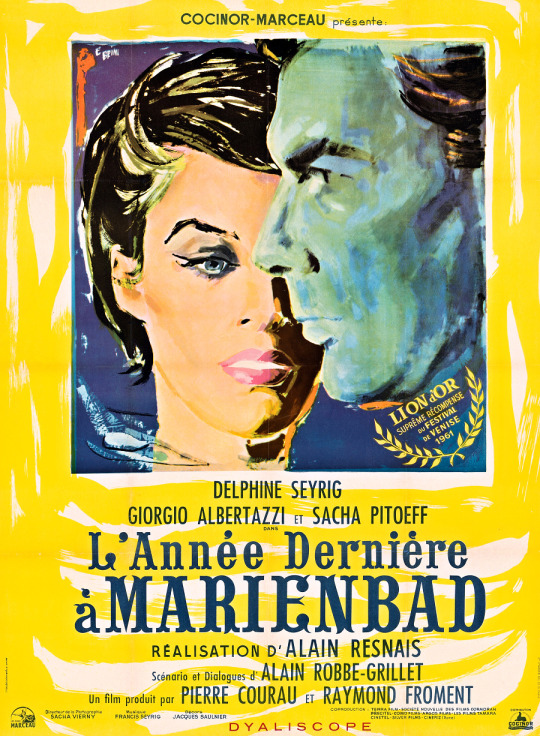
L'année dernière à Marienbad avec Delphine Seyrig, film d'Alain Resnais, 1961.
Synopsis : Dans un château de bohême transformé en hôtel, des gens vivent dans une atmosphère feutrée. Ils sont là pour se reposer, et tout autre bruit que quelques paroles chuchotées est proscrit. Un homme s’attache à une femme et tente de la persuader qu’ils ont eu une aventure, l’année précédente, à Marienbad. Il lui a laissé un an de réflexion et il est maintenant temps pour elle de partir avec lui. La jeune femme affirme n'avoir « jamais été à Frederiksbad ». Ce pouvait être alors ailleurs, « à Karlstadt, à Marienbad, à Baden-Salsa ».
3 notes
·
View notes
Text
"Tatort"-Drehorte in München - Teil 2
Episode: "Viktualienmarkt"
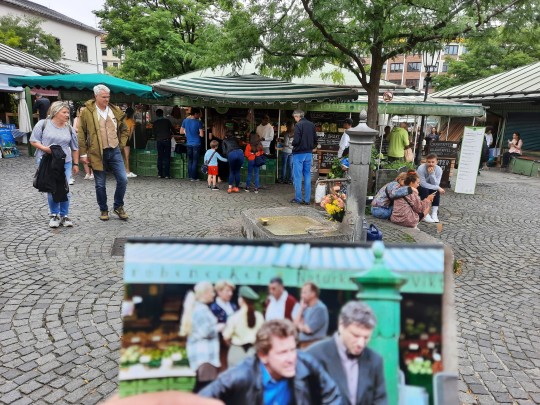
Einer meiner liebsten Orte in München, an dem ich auch drei Jahre lang gearbeitet habe.
Ab 1807 entstand auf dem ehemaligen Gelände des Heilig-Geist-Spitals der größte dauerhafte Markt Münchens. Jeden Tag außer Sonntags werden hier an (seit 1870) festen und temporären Ständen vor allem Lebensmittel angeboten.
In den 1950ern wurden auf dem Markt Brunnen für Münchner Künstlerinnen und Künstler aufgestellt: Liesl Karlstadt, Karl Valentin. Weiß Ferdl, Ida Schumacher, Elise Aulinger und den Roider Jackl.
7 notes
·
View notes
Photo
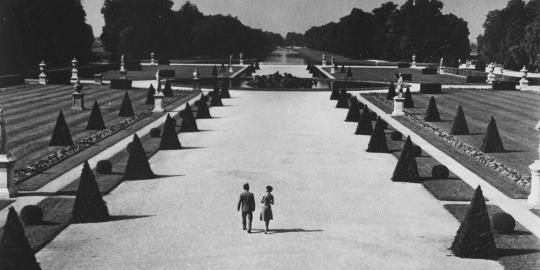
Alain Resnais - L'Année dernière à Marienbad
« Dans un grand hôtel de luxe, un homme tente de convaincre une femme qu'ils ont eu une liaison l'année précédente, qu'il lui a laissé un an de réflexion et qu'il est maintenant temps pour elle de partir avec lui. La jeune femme affirme n'avoir “jamais été à Frederiksbad". Ce pouvait être alors ailleurs, "à Karlstadt, à Marienbad, à Baden-Salsa" » (Wiki)
Non je ne vois pas qui vous êtes
2 notes
·
View notes
Text
Martin Luther, Atheism, Secularism and Individualism.
Martin Luther, without realising it, gave us 3 -isms. Atheism, Secularism and Individualism. He was the first to give us the idea of thinking for yourself- not being told- a profound scepticism against the religious tradition. Luther’s great argument is sola scriptura, if it's not in the Bible, get rid of it. The logical implication of that is why only scripture? Why not get rid of scripture as well? And essentially that is the kind of the end point that Protestant countries arrived at. The process of the reformation logically ends with atheism, which is why so many prominent atheists and humanists sound so Protestant. They are evangelical, eg Richard Dawkins.
Luther would be scandalised to see what has happened. He was very angry when 2 of his faithful followers Karlstadt and Müntzer took things much further than he wished, even though they remained within what we would recognise as Protestantism. Karlstadt, an early supporter of Luther, went on to press for more extensive reforms in theology and church life. Müntzer believed that the Bible states that all people are equal- an inspiring message to those who lived as peasants. After the Battle of Frankhausen Luther published a tract entitled “Against the Robbing and Murdering Hordes of Peasants”
0 notes
Text
Den goldenen Herbst im Fränkischen Weinland erleben
Seniorinnen und Senioren können von Karlstadt aus die Ferienregion erkunden
(DJD). Für Seniorinnen und Senioren war der Herbst schon immer die beliebteste Reisezeit. Die Hitze des Sommers ist deutlich angenehmeren Temperaturen gewichen, die Natur erstrahlt in leuchtend bunten Farben, es ist noch lange hell. Die Jahreszeit lädt vor allem zum Wandern oder Radeln ein. Den goldenen Herbst kann man…
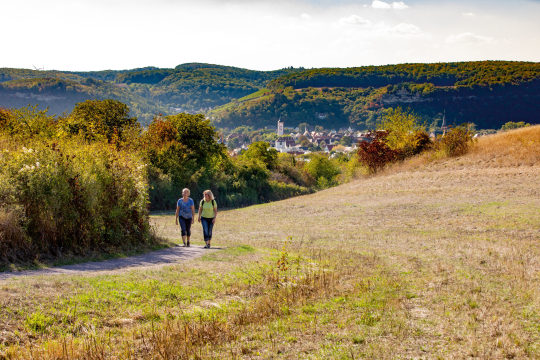
View On WordPress
#Ausflüge#Bayern#Deutschlandreisen#Genuss#Geschmack#Herbst#Karlstadt#Radfahren#Radwandern#Reisen#Reisetipps#Sehenswürdigkeit#Senioren#Tourismus#Urlaub#Wandern#Wein
0 notes
Text
Hotel in Karlstadt schnell finden – Rooms24
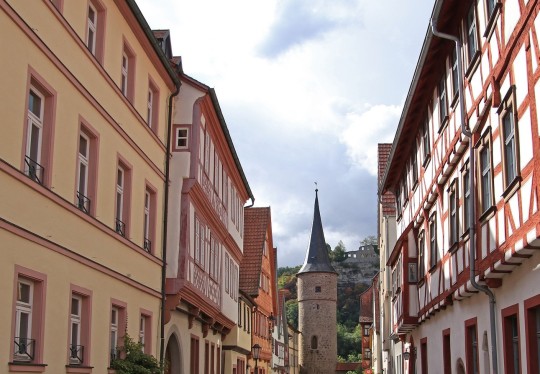
Suchen Sie ein Hotel in Karlstadt? Wenn ja, dann haben Sie Glück! Karlstadt ist eines der beliebtesten Reiseziele in Europa, und als solches gibt es eine große Auswahl an Hotels. Aber bei so vielen Optionen kann es schwierig sein zu wissen, wo man anfangen soll. Keine Sorge, – wir sind hier, um zu helfen. In diesem Blogbeitrag geben wir Ihnen einige Tipps, wie Sie das perfekte Hotel für Ihren Karlstadt-Urlaub finden. Wir werden darüber sprechen, worauf Sie in einem Hotel achten sollten, wo Sie nach Hotels suchen und wie Sie verschiedene Hotels vergleichen können. Am Ende dieses Beitrags sind Sie ein Experte für die Suche nach Hotels in Karlstadt... Weiterlesen
#deutschland#karlstadt#rooms24#rooms#ferienvermietung#ferienhaus#ferienwohnung#monteurzimmer#gästezimmer#unterkünfte#privat unterkünfte#unterkunft#hotelangeboten#luxury hotel#hotels#hotel#hotels and resorts
0 notes
Text
The Protestant Reformation
The Protestant Reformation challenged many different aspects of life that were already comfortably established. The Reformation challenged the heart of society, the Church. This was a turning point in sixteenth-century Europe where pre-established notions surrounding economic, political and cultural ideas that affected society were questioned instead of blindly followed. Once again in the life-cycle of society, the norms that society had become accustomed to were challenged. Art, culture and day-to-day life changed, the new ideals of society readily accepted by those who questioned the old.
But before we understand the impact the Reformation had we must understand what the Reformation was, a revolution. Revolutions are said to be the beginnings of the nations, of ideas born for the betterment of man. Not all revolutions have political roots, many are just landmarks in the culture and history of a nation. No matter how small a revolution is, its effects can be seen in the art, religious activity and changes in society following it. The word ‘Protestant’ comes from the ‘protestation’ that princes and town delegates signed to suspend the Edict of Worms. The Edict of Worms was a proclamation condemning Luther and his followers. It was first introduced in 1521, suspended in 1526 and then reinstated years later in 1529.
The Protestant Reformation changed many things when it came to how the people viewed the Church. Papal Infallibility was questioned. No longer was the Church this untouchable institution, it was not the ‘Only international agency to possess any significant credibility or influence.’ (McGrath, 2007, p.161). Martin Luther (and others later on) questioned the idea of Indulgences and why they could affect a person’s salvation. In Luther’s beliefs, salvation was earned solely from a person’s penitence and faith in Christ.
In the 16th century, Indulgences had become profit-orientated, Pope Leo X selling Indulgences to support the rebuilding of St Peter’s Basilica in Rome. Johann Tetzel, a controversial Friar that sold Indulgences, even had a slogan. Historian Peter Marshall refers to the saying ‘as soon as the coin in the coffer rings, a soul from purgatory to heaven sings’ as an ‘advertising jingle’ (2009, p15). In protest to the commercialisation of religion, Martin Luther nailed his 95 Theses to the Church Door in Wittenberg and sent them to the Archbishop of Mainz on the 15th of October 1517. Luther debated with other ‘reformers’ Andreas Bodenstein von Karlstadt and theologian Johann Eck. This debate, known as the Leipzig Disputation, substantially raised Luther’s presence.
In 1520, Luther’s reformation evolved beyond the abolishment of Indulgences to include the ideas that;
The bible has the utmost authority on salvation for both the church and individual christian.
Salvation was a universal gift, obtained by faith in God alone.
The clergy didn’t have superiority above the average churchgoer, all were equal in God’s eyes. This later became known as the ‘priesthood of all believers’.
With the emphasis on the Bible being the ultimate authority and salvation coming only from faith and penitence, the need for Indulgences faded away. This also meant that the Bible needed to be translated from Latin into German and in extension other Languages. For there to be equality among all believers, then all must be able to read the Bible themselves and gain the gift of salvation. Equality in worship also meant that the hierarchy of the clergy was questioned. Instead of the exclusivity previously enjoyed by the church, reformers advocated for a more democratic internal structure.
The Reformation also brought change in religious practices that were pillars of the culture. Iconography was rejected, the Zurich-led reformation steadfast in the destruction of images. Leo Jud, a friend of Zurich-based reformer Huldrych Zwingli argued that in the 10 commandments of the Old Testament, God forbade the creation of his likeness. Churches in Zurich removed icons of Christ and Mother Mary and images of the pair were removed from public places as well. This matter was one that both Zwingli and Luther disagreed upon greatly. Another change brought in by the reformation is the reduction of sacraments. The Catholic Church has several sacraments (Baptism, Confirmation, Eucharist, Penance and Reconciliation, Anointing of the Sick, Holy Orders, and Matrimony). The Lutheran Church however settled on two (baptism and the Lord's Supper, Eucharist). (Boersma & Levering, 2015, 269). This is not a constant in all Protestant denominations. Some denominations that have branched off Protestantism such as the Mennonites have multiple sacraments.
In conclusion, the Protestant reformation took the norm created by the Church and the culture surrounding it and turned it on its head. The Reformation led to questions being asked that wouldn’t have been if change didn’t happen. Society changed as well, no longer were the art and daily routines that came with the Catholic church the norm. Art moved away from being heavily religious, to more secular historical pieces. Not that all art in churches was entirely shunned, ‘the Reformation renewed rather than removed the religious image.’ (Dixon, 2012, p.146)
1 note
·
View note
Text
Hörbahn on Stage: Gunna Wendt liest aus "Waren wir doch Teile voneinander - Geschichten von berühmten Schwestern" und spricht mit Uwe Kullnick über ihre Liebe zum Schreiben
Hörbahn on Stage: Gunna Wendt liest aus “Waren wir doch Teile voneinander – Geschichten von berühmten Schwestern” und spricht mit Uwe Kullnick über ihre Liebe zum Schreiben
[vc_row][vc_column][vc_column_text]
Hörbahn on Stage: Gunna Wendt liest aus “Waren wir doch Teile voneinander – Geschichten von berühmten Schwestern” und spricht mit Uwe Kullnick über ihre Liebe zum Schreiben
Lesung Gunna Wendt (Hördauer ca. 27 min)
https://literaturradiohoerbahn.com/wp-content/uploads/2022/11/HoS_Gunna-Wendt-Schwestern-Lesung-upload.mp3
Gespräch zwischen Gunna Wendt und Uwe…
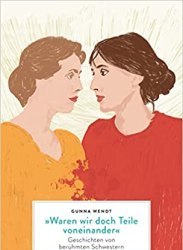
View On WordPress
#Amalie Wellano#Annette von Droste-Hülshoff#– Sisi & Néné#Charlotte von Schiller#Elsa Triolet#Emily Brontë#Frieda von Richthofen#Großfürstin Elisabeth#Gudrun Ensslin#Hörbahn on Stage#Liesl Karlstadt#Lilja Brik#Liselotte Pulver#Princess Margaret#Queen Elizabeth#Simone de Beauvoir#Sophie Scholl#Uwe Kullnick#Vanessa Bell#Virginia Woolf#Zarin Alexandra
1 note
·
View note
Text
Weihnachtsmarkt unterm Muezzinruf: Kultureller Selbstmord
Ansage: »Die deutsche Kapitulation vor dem Islam erreicht Ausmaße, die, trotz aller Tragik, bereits die Grenze zur Realsatire überschreiten. In ihrer selbstmörderischen Toleranzbesoffenheit, haben die Stadtoberen des fränkischen Karlstadt bei Würzburg den nach dem heiligen Andreas, einem Jünger Jesu, benannten Vorweihnachtsmarkt allen Ernstes unter die Kontrolle der örtlichen Moschee-Verbände gestellt – einschließlich der in direkter Abhängigkeit vom türkischen […]
The post Weihnachtsmarkt unterm Muezzinruf: Kultureller Selbstmord first appeared on Ansage. http://dlvr.it/SzcFxp «
0 notes
Text
En el epicentro de ese movimiento, a principios del siglo XVI, se encontraba la salvación del cristiano, pero las sacudidas del mismo eran alimentadas por algunos otros rasgos comunes, concretamente: la crítica a la Iglesia de Roma, una lectura directa de las sagradas Escrituras, el mesianismo, milenarismo, profetismo y las aspiraciones de justicia social de las capas más desfavorecidas de la sociedad. Este último punto inspiraba las predicaciones y conspiraciones de un complejo muy heterogéneo de hombres como Andreas von Bodenstein Karlstadt, Hans Denk, Conrad Grebel, Jacob Hutter, Jan de Leyden, Anna Jansz, Kaspar von Schwenckfeld... o el propio Thomas Müntzer, quienes, a su vez, alentaban opciones no coincidentes totalmente entre sí dentro del cristianismo, pero que convergían en sus aspiraciones de justicia social entendida como el resultado del Apocalipsis y el advenimiento de una nueva Jerusalén.
Tomás A. Mantecón Movellán.
0 notes
Text
Münchner Arbeiterbewegung 1919-1922 bis 27.10. in der Seidlvilla

GETRENNT & VEREINT. Die Münchner Arbeiterbewegung im Kampf um die Republik 1919-1922
Eine Ausstellung des Archivs der Münchner Arbeiterbewegung e. V. in der Seidlvilla vom 22. September bis 27.Oktober 2023
Mitarbeiterinnen der Arbeitsgruppe "GETRENNT & VEREINT":
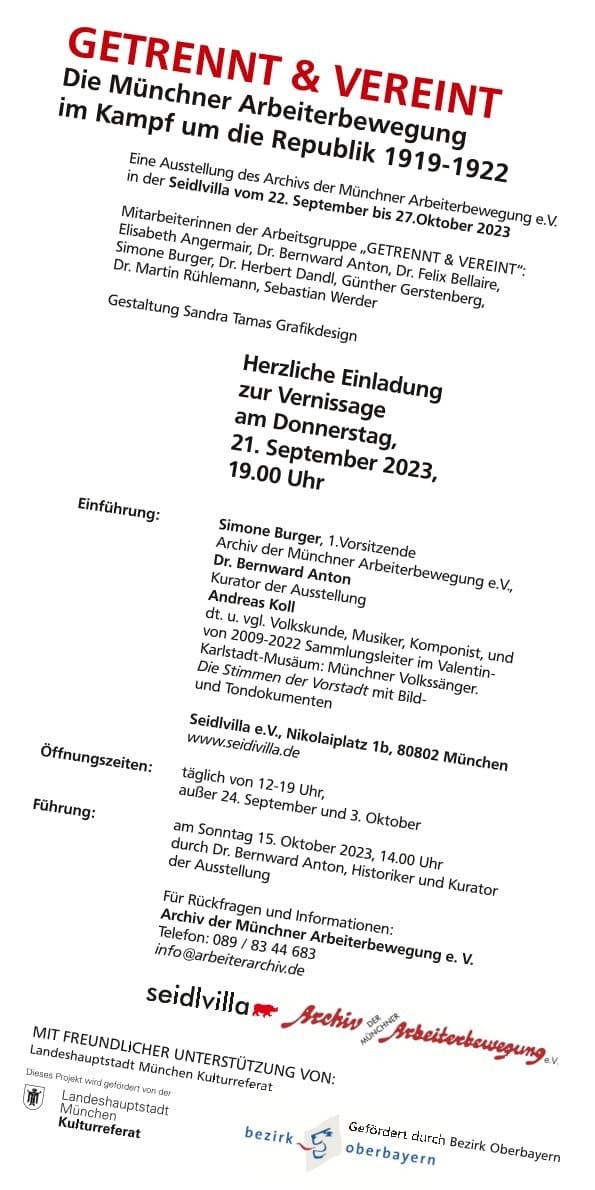
Elisabeth Angermair, Dr. Bernward Anton, Dr. Felix Bellaire, Simone Burger,
Dr. Herbert Dandl, Günther Gerstenberg, Dr. Martin Rühlemann,
Sebastian Werder, Gestaltung: Sandra Tamas Grafikdesign -
Mit Unterstützung des Kulturreferates München und des Bezirks Oberbayern
Herzliche Einlagung zur Vernissage am Donnerstag, 21. September 2023, 19 Uhr
Einführung: Simone Burger, 1.Vorsitzende Archiv der Münchner Arbeiterbewegung e.V.
Dr. Bernward Anton, Kurator der Ausstellung
Andreas Koll, dt. u. vgl. Volkskunde, Musiker, Komponist, und von 2009-2022 Sammlungsleiter im Valentin-Karlstadt-Musäum:
Münchner Volkssänger. Die Stimmen der Vorstadt mit Bild und Tondokumenten
Seidlvilla e.V., Nikolaiplatz 1b, 80802 München, www.seidlvilla.de
Öffnungszeiten: täglich von 12-19 Uhr - außer 24. September und 3. Oktober
Führung am Sonntag 15. Oktober 2023, 14 Uhr durch Dr. Bernward Anton, Historiker und Kurator der Ausstellung
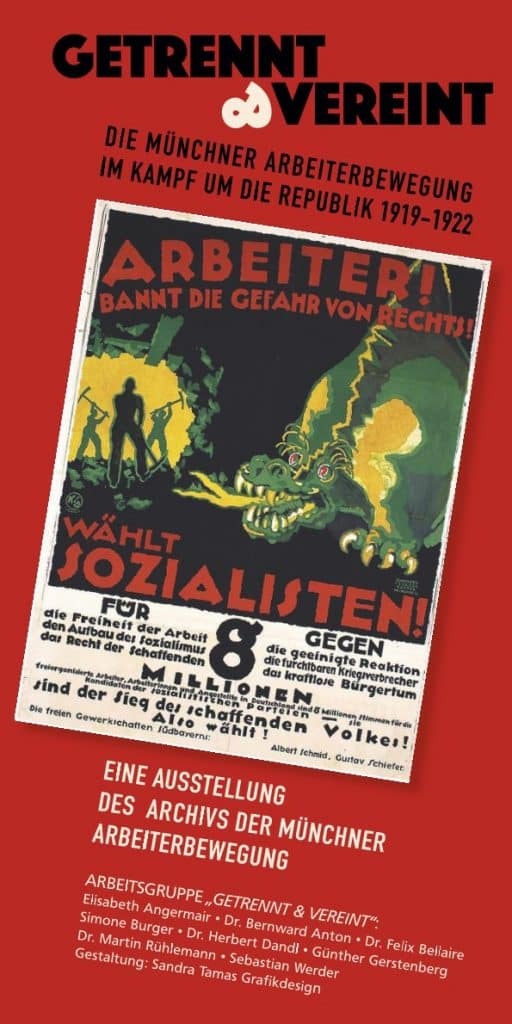
Archiv der Münchner Arbeiterbewegung e.V. Ebenböckstr. 11, 81241 München Tel/Fax: 089/834 46 83 www.arbeiterarchiv.de
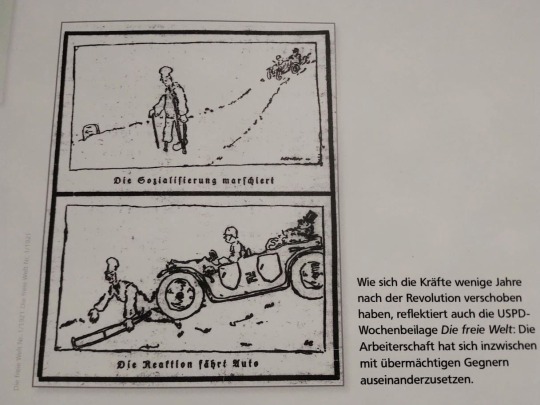

7 Fahnentragende Männer1. rot (sozialist) 2. rot in gelben Flammen, trägt dabei eindeutig „jüdische" Züge, 3. schwarz gekleideter Pfaffe, 4. Weiss nur schwarz umrandet, Freikorps-Militarist, 5. Professor mit Zwicker und schwarz-rot-gold, 6. Militarist mit schwarz-weiss-roter Reichskriegsflagge, 7. Bayer mit Schnauzbart und Hut, bar. Rautenfahne und Kleidung Simplicissimus Nr. 16 v. 15.7.1918
Exemplarisch für die konservative Weltsicht des Bürgertums wieder der Simplicissimus: In der holzschnittartigen Deutung der Zeitschrift steht die USPD für Umsturz und Gewalt, sie trägt dabei eindeutig „jüdische" Züge.
Getrennt & Vereint
Die Münchner Arbeiterbewegung im Kampf um die Republik 1919–1922 - Herausgegeben vom Archiv der Münchner Arbeiterbewegung e. V. Mit Beiträgen von Elisabeth Angermair, Bernward Anton, Felix Bellaire, Simone Burger, Herbert Dandl, Günther Gerstenberg, Martin Rühlemann, Sebastian Werder, Broschur, 21 x 29,7 cm 200 Seiten, ca. 200 Abbildungen ISBN 978-3-948974-23-7 24,00 Euro Versand innerhalb Deutschlands: 2 Euro Preise inkl. MwSt - Bildrechte dort zu klären!
Die Ausstellung schildert die wenig bekannte Zeit zwischen der Niederschlagung der Räte und dem militaristischen Erstarken der Rechten in München und Baiern:
Adolf Hitler noch als militärischer Spitzel, der aber gut feördert wird, und alle Kräfte, die im Hintergrund mit ihrer adeligen und reichen Anti-Sozialistischen Haltung mit wirken, eine autoritäre "alte Ordnung" des Königtums noch mal fest zu halten, mit riesigen Kriegskassen und im Bemühen, die "Versailler Verträge" zu unterlaufen:
Waffenlager in Kirchenspeichern, Schützenfeste und reichlich Sold von den Arbeitgebern im "Anti-Bolschewisten-Fonds", hier mit Zylinder fett hinten in der Limousine sitzend: Der Fahrer mit Stahlhelm und die Karosse mit (verkehrtem!) Hakenkreuz - Die Arbeitgeber-Verbände hatten für 500 Mio Goldmark einen AntiBolschewistenFonds beschlossen, aus dessen Mittel die Mörder von Karl Liebknecht und Rosa Luxemburg bezahlt wurden, wohl auch die enormen Sold-Zahlungen für die Freikorps und ihre reaktionären Führer, https://de.wikipedia.org/wiki/Antibolschewistische_Liga

Die Sozialisierung marschiert 1. Bild: Kriegskrüppel mit Krücken) 2. Bild Auto überfährt den fallenden Soldaten
Wie sich die Kräfte wenige Jahre nach der Revolution verschoben haben, reflektiert auch die USPD- Wochenbeilage Die freie Welt: Die Arbeiterschaft hat sich inzwischen mit übermächtigen Gegnern auseinanderzusetzen.
Die freie Welt Nr. 1/1921 Die freie Welt Nr. 1/1921
Read the full article
0 notes